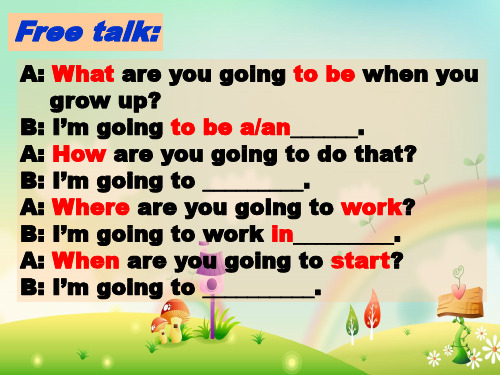新目标英语八年级上UNIT 7 课件
- 格式:ppt
- 大小:1.35 MB
- 文档页数:19


人教新目标英语八年级上册Unit 7 Will people have robots?一、重点单词paper n. 纸,纸张future n. 将来,未来environment n. 环境earth n. 地球,世界space n. 太空,空间human adj. 人的 n. 人already adv. 已经,早已disagree v. 不同意,持不同意见during prep. 在……期间pollution n. 污染,污染物pollute v. 污染planet n. 行星peace n. 和平even adv. 甚至,连,愈加dangerous adj. 有危险的,不安全的believe v. 相信,认为有可能possible adj. 可能的holiday n. 假期,假日不可数名词paper pollution environment water air time spacepollute动词----pollution名词predicte动词---prediction名词peace名词----peaceful形容词danger名词----dangerous形容词factory名词-----复数factories agree-----反义词 disagreefall---过去式fellinside----反义词 outsidepossible----反义词impossible probable形容词-----副词probably human----复数humans前面加an 的名词有astronaunt apartment engineer article二、重点短语on computers在电脑上on paper在纸上a piece of paper 一张纸in the future 在未来in 100 years在一百年以后live to be 200 years old活到200岁in people’s home 在人们家里in an apartment在公寓free time空闲时间in danger处于危险之中in the world 在世界上on the earth在地球上play a part in sth参与某事on a space station在太空站in space在太空look for寻找computer pro电脑编程员grammer over and over again反复地get bored感到厌烦的wake up醒来look like看起来像fall down倒塌,摔倒in the country在乡村,在国家take a train to school坐火车去上学human servants人类仆人fly rockets to the moon放飞火箭到月球in dirty or dangerous places在脏或者危险的地方do simple jobs 做简单的工作do same jobs 做同样的工作the same …as …和…一样…will be polluted 将会被污染in great danger 处于极度危险中as soon(quickly/fast) as possible 尽可能快的 if possible 如果可能what will happen 什么将会发生fly to +地点==go to +地点 by plane/airwill+动词原形将要做 fewer/more +可数名词复数更少/更多……less/more+不可数名词更少/更多……try to do sth尽力做某事have to do sth不得不做某事agree with sb同意某人的意见such+名词如此……play a part in doing sth参与做某事make sb do sth让某人做某事help sb with sth帮助某人某事There will be +主语+其他将会有……There is/are+sb./sth.+doing sth 有……正在做某事It is +形容词+for sb +to do sth 做某事对某人来说是怎样的三、重点句子:1. -----What will the future be like ?将来会是什么样子的?----- Cities will be more pollution.And there will be fewer trees. 将来城市会污染得更严重,树木将会少得多。


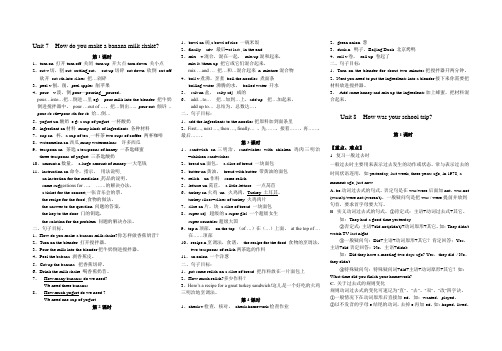
Unit 7 How do you make a banana milk shake?第1课时1、turn on 打开turn off 关闭turn up 开大点turn down 关小点2、cut v.切,割cut- cutting cut,cut up切碎cut down 砍倒cut off砍开cut sth into slices 把…剁碎3、peel v.刨,削,peel apples 削苹果4、pour v.泼,倒pour—pouring poured,pour…into…把…倒进…里eg: pour milk into the blender 把牛奶倒进搅拌器中。
pour …out of …,把…倒出…,pour out 倾诉,pour sb sth=pour sth for sb 给…倒…5、yogurt un.酸奶e g: a cup of yogurt 一杯酸奶6、ingredient cn.材料many kinds of ingredients 各种材料7、cup cn. 杯,a cup of tea ,一杯茶two cups of coffee 两杯咖啡8、watermelon cn.西瓜,many watermelons 许多西瓜9、teaspoon cn. 茶匙a teaspoons of honey 一茶匙蜂蜜three teaspoons of yogurt 三茶匙酸奶10、amount n.数量,a large amount of money一大笔钱11、instruction cn.命令,指示,用法说明,an instrction for the medicine ,药品的说明,some sug gestions for …,……的解决办法,a ticket for the concert,一张音乐会的票,the recipe for the food ,食物的做法,the answer to the question 问题的答案,the key to the door 门的钥匙,the solution for the problem 问题的解决办法。
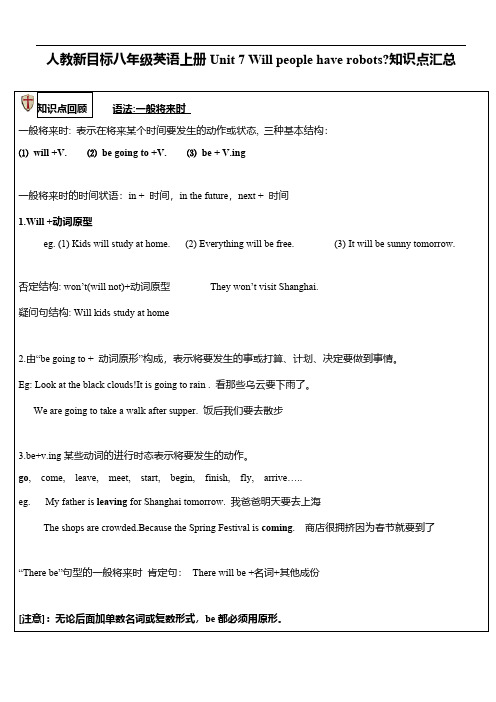
知识点回顾语法:一般将来时一般将来时: 表示在将来某个时间要发生的动作或状态, 三种基本结构:⑴will +V. ⑵be going to +V. ⑶be + V.ing一般将来时的时间状语:in + 时间,in the future,next + 时间1.Will +动词原型eg. (1) Kids will study at home. (2) Everything will be free. (3) It will be sunny tomorrow.否定结构: won’t(will not)+动词原型They won’t visit Shanghai.疑问句结构: Will kids study at home2.由“be going to + 动词原形”构成,表示将要发生的事或打算、计划、决定要做到事情。
Eg: Look at the black clouds!It is going to rain . 看那些乌云要下雨了。
We are going to take a walk after supper. 饭后我们要去散步3.be+v.ing某些动词的进行时态表示将要发生的动作。
go, come, leave, meet, start, begin, finish, fly, arrive…..eg. My father is leaving for Shanghai tomorrow. 我爸爸明天要去上海The shops are crowded.Because the Spring Festival is coming. 商店很拥挤因为春节就要到了“There be”句型的一般将来时肯定句:There will be +名词+其他成份[注意]:无论后面加单数名词或复数形式,be都必须用原形。
要点讲解Will there重点短语it will be difficult to do sth.不同意某人重点搭配重点短语Section A:1.play a part in saving the earth2.in 100 years3.on computers4.live to be….years old5.less free time6.world peace7.be free8.in great danger9.in the future10.move to other planetsSection B:1.fly rockets to the moon乘火箭到月球→fly up into the sky2.on a space station3.be able to…4.look for5.look like6.take a holiday7.the meaning of…..8.wake up….9.one day10.hundreds of11.over and over again12.do the same things as humans13.fall down14.seem impossible15. as a reporter语法聚焦----Will people use money----No, they won’t. Everything will be随堂练There ______a splendid football event(.I hope we'll study ______ home ______computers in the future.in;We should play a part in ______the party.organizingWe will have ______ free time next year than this year.Michael or Tony?______ ______ be a soccer match this weekend?.我们今天下午要为英语考试作准备。



人教新目标英语八年级上册Unit 7 Will people have robots?词句精讲精练词汇精讲1. duringduring是介词,意为“在……期间”。
例如:I went to see my uncle during my stay in Beijing. 我在北京逗留期间去北京看我叔叔了。
【拓展】during;in与for(1) during指“在……时间内,在……的期间”。
谓语动词常为表示持续性的动作或状态的动词,时间段前常有限定词(the; 物主代词等),表特指。
例如:He asked many questions during the three meetings. 在这三次会议期间,他问了许多问题。
(2) in意为“在……时间内”,一般情况下可以和during互换,用in时往往强调某一动作发生在某一时间段中的某一时间点;during既可表示“在整个时间段期间”,也可表示“某时间段内的某个时间点”。
例如:Mike put his hand up three times during/in the class. 在这节课内,Mike举了三次手。
(3) for意为“(时间)长达……”,强调时间由始至终,动作也贯穿这段时间的始终,可以和完成时连用。
强调持续时间的长短,回答how long的提问;而during则是指动作所发生的时间,回答when的提问。
例如:He stayed in Beijing for two years. 他在北京住了两年。
He swims every day during the summer. 夏天他每天去游泳。
2. in 100 yearsin 100 years意为“100年之后”,是由“介词in + 一段时间”构成,表示“在……之后”,多用于一般将来时。
对此短语提问时常用how soon。
例如:I will finish the task in two hours. 我将在两个小时后完成这项任务。
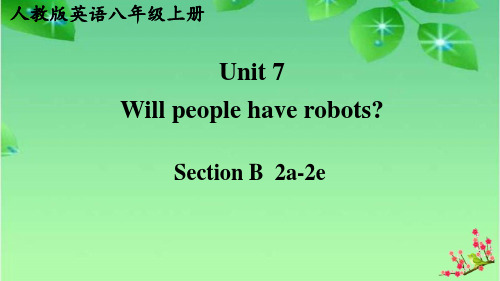

Unit 7 Will people have robots? (讲义) Words and expressionspaper /'peɪpə(r)/ n. 纸;纸张pollution /pə'luːʃn/ n. 污染;污染物prediction /prɪ'dɪkʃn/ n. 预言;预测future /'fjuːtʃə(r)/ n. 将来;未来pollute /pə'luːt/ v. 污染environment /ɪn'vaɪrənmənt/ n.环境planet/'plænɪt/ n. 行星earth /ɜː(r)θ/n. 地球;世界plant /plɑːnt/ v. 种植n. 植物part /pɑː(r)t/ n. 参加;参与;部分play a part 参与(某事)peace /piːs/ n. 和平sea /siː/ n. 海;海洋sky /skaɪ/ n. 天空astronaut /'æstrənɔːt/ n. 宇航员;航天员apartment /ə'pɑː(r)tmənt/ n. 公寓套房rocket /'rɒkɪt/ n. 火箭space /speɪs/ n. 太空;空间space station 太空站;宇宙空间站human /'hjuːmən/ adj. 人的n. 人servant /'sɜː(r)vənt/ n. 仆人dangerous /'deɪndʒərəs/ adj. 有危险的;不安全的already /ɔːl'redi/ adv.已经;早已factory /'fæktəri/ n. 工厂over and over again 多次;反复地believe /bɪ'liːv/ v.相信;认为有可能disagree /,dɪsə'griː/ v.不同意;持不同意见;有分歧even /'iːvn/ adv.甚至;连;愈加hundreds of 许多;大量shape /ʃeɪp/ n. 形状;外形fall /fɔːl/ v. (fell /fel/) 倒塌;跌倒;掉落fall down 突然倒下;跌倒;倒塌inside /ɪn'saɪd/ adv. & prep. 在……里面look for 寻找;寻求possible /'pɒsəbl/ adj. 可能存在或发生的;可能的impossible /ɪm'pɒsəbl/ adj. 不可能存在或发生的;不可能的side /saɪd/ n. 一方(的意见、态度、立场)probably /'prɒbəbli/ adv.很可能;大概during /'djʊərɪŋ/ prep. 在……期间holiday /'hɒlədeɪ/ n. 假期;假日word /wɜː(r)d/ n. 单词;词Nick /nɪk/ 尼克(男名)James /dʒeɪmz/ 詹姆斯(男名)White /waɪt/ 怀特(姓)Role-playNick: What are you reading, Jill?Jill: It’s a book about the future.Nick: Sounds cool. So what will the future be like?Jill: Well, cities will be more crowded and polluted. There will be fewer trees and the environment will be in great danger. Nick: That sounds bad! Will we have to move to other planets? Jill: Maybe. But I want to live on the earth.Nick: Me, too. Then what can we do?Jill: We can use less water and plant more trees. Everyone should play a part in saving the earth.Grammar focus’ll=willwon’t=will not3a Fill in the blanks with more, less or fewer.1.In the future, there will be fresh water because there will bepollution in the sea.2.In 100 years, there will be cars because there will bepeople in the cities.3.There will be jobs for people because robotswill do the same jobs as people.4.I think there will be cities because people will buildbuildings in the country.5.In 50 years, people will have free time because therewill be things to do.Reading2b Read the article and match each paragraph with the questionsit discusses.Paragraph 1 Will robots think like humans in thefuture? Paragraph 2 What will robots be like in the future? Paragraph 3 What can robots do today?Paragraph 4 What are robots like in movies?Do You Think You Will Have Your Own Robot?1.When we watch movies about the future, we sometimes see robots. Theyare usually like human servants. They help with the housework and do jobs like working in dirty or dangerous places.2.Today there are already robots working in factories. Some can helpto build cars, and they do simple jobs over and over again. Fewer people will do such jobs in the future because they are boring, but robots will never get bored.3.Scientists are now trying to make robots look like humans and dothe same things as we do. Some robots in Japan can walk and dance.They are fun to watch. However, some scientists believe that although we can make robots move like people, it will be difficult to make them really think like a human. For example, scientist James White thinks that robots will never be able to wake up and know where they are. But many scientists disagree with Mr. White. They think that robots will even be able to talk like humans in 25 to 50 years.4.Some scientists believe that there will be more robots in the future.However, they agree it may take hundreds of years. These new robots will have many different shapes. Some will looks like humans, and others might look like animals. In India, for example, scientists made robots that look like snakes. If buildings fall down with people inside, these snake robots can help look for people under thebuildings. This was not possible 20 years ago, but computers and rockets also seemed impossible 100 years ago. We never know what will happen in the future!Exercises一、填空1.Our (环境) will be better if we protect it.2.The (预言) didn’t come true.3.His uncle is an (宇航员).4.He worked in a (太空站) last year.5.There are five (仆人) in his family.6.Tom was surprised by all the (pollute) on the beach.7.We hope the world will be (peace).8.Be away from the tiger. It’s(danger).9.It’s too late. I (agree) that we go there today.10.It seems (possible) that people can fly.二、单选( )11. Please pass me two .A.pieces of paperB. pieces of papersC. pieces paperD. piece papers( )12. Let’s play a part the room.A. cleanB. cleaningC. to cleanD. in cleaning( )13. volunteers will give out leaflets(传单) to ask people to protect the wetlands(湿地).A. Two hundredsB. Hundreds ofC. Two hundred ofD. Hundred of( )14. , Tom! It’s time to get up and go to school.A. Wake upB. Make upC. Grow upD. Look up ()15. John will go to France on vacation this summer.A. possibleB. impossibleC. probablyD. probable( )16. It is difficult for a robot _ thesame things aperson does.A. doing; likeB. do; fromC. to do; asD. does; as( )17. —What are you doing in the room?—I’m my hat.A. looking afterB. looking forC. looking upD. looking like( )18. There are some students the classroom.A. cleanB. to cleaningC. cleaningD. cleans( )19. There are many clouds _ the sky.A. inB. onC. atD. to( )20. I think the movie is interesting. But he disagrees me.A. inB. withC. toD. of( )21. It’s7 p.m., but the children are not backyet.A. alsoB. eitherC. alreadyD. only( )22. If there are people driving, there will be _air pollution.A. less; lessB. less; fewerC. fewer; fewerD. fewer;less( )23. —Willthere be schools in the future?—I think students will study at home on the Internet.A. Yes, there will.B. No, there won’t.C. Yes, there is.D. No, there isn’t.三、翻译24.你同意将来会有更多的污染吗?Do you that there will be more pollution?25.你能告诉我未来是什么样子吗?Can you tell me what the ? 26.你必须反复地练习才能做得很好。
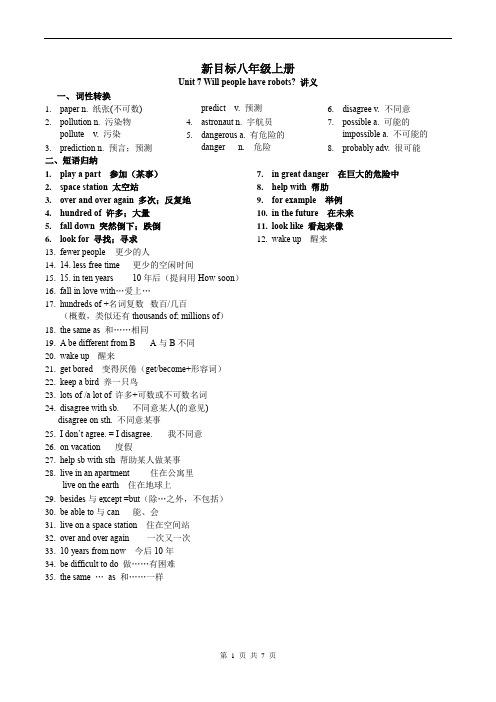
新目标八年级上册Unit 7 Will people have robots? 讲义一、词性转换1.paper n. 纸张(不可数)2.pollution n. 污染物pollute v. 污染3.prediction n. 预言;预测predict v. 预测4.astronaut n. 宇航员5.dangerous a. 有危险的danger n. 危险6.disagree v. 不同意7.possible a. 可能的impossible a. 不可能的8.probably adv. 很可能二、短语归纳1.play a part 参加(某事)2.space station 太空站3.over and over again 多次;反复地4.hundred of 许多;大量5.fall down 突然倒下;跌倒6.look for 寻找;寻求7.in great danger 在巨大的危险中8.help with 帮助9.for example 举例10.in the future 在未来11.look like 看起来像12.wake up 醒来13.fewer people更少的人14.14. less free time更少的空闲时间15.15. in ten years 10年后(提问用How soon)16.fall in love with…爱上…17.hundreds of +名词复数数百/几百(概数,类似还有thousands of; millions of)18.the same as 和……相同19.A be different from B A与B不同20.wake up醒来21.get bored变得厌倦(get/become+形容词)22.keep a bird 养一只鸟23.lots of /a lot of许多+可数或不可数名词24.disagree with sb.不同意某人(的意见)disagree on sth. 不同意某事25.I don’t agree. = I disagree.我不同意26.on vacation度假27.help sb with sth 帮助某人做某事28.live in an apartment住在公寓里live on the earth 住在地球上29.besides与except =but(除…之外,不包括)30.be able to与can 能、会31.live on a space station 住在空间站32.over and over again 一次又一次33.10 years from now 今后10年34.be difficult to do 做……有困难35.the same …as 和……一样三、重难点深度解析1. Do you think there will be robots in people's homes? 你认为将来人们的家里会有机器人吗?Do you think...? 结构通常用来征求对方的意见或看法,后面接宾语从句,从句用陈述语序。


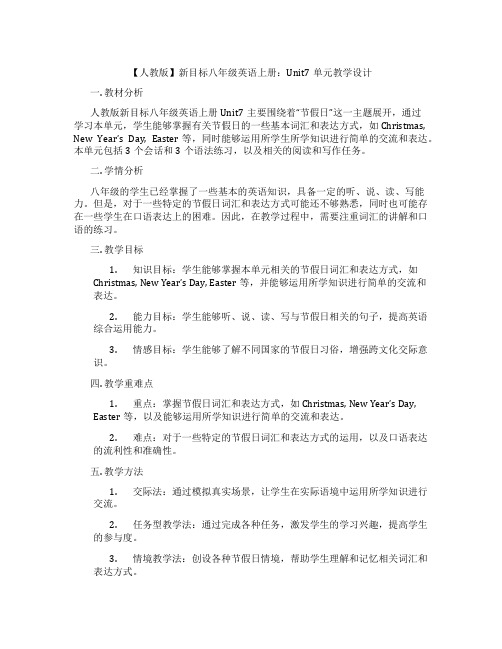
【人教版】新目标八年级英语上册:Unit7单元教学设计一. 教材分析人教版新目标八年级英语上册Unit7主要围绕着“节假日”这一主题展开,通过学习本单元,学生能够掌握有关节假日的一些基本词汇和表达方式,如Christmas, New Year’s Day, Easter等,同时能够运用所学生所学知识进行简单的交流和表达。
本单元包括3个会话和3个语法练习,以及相关的阅读和写作任务。
二. 学情分析八年级的学生已经掌握了一些基本的英语知识,具备一定的听、说、读、写能力。
但是,对于一些特定的节假日词汇和表达方式可能还不够熟悉,同时也可能存在一些学生在口语表达上的困难。
因此,在教学过程中,需要注重词汇的讲解和口语的练习。
三. 教学目标1.知识目标:学生能够掌握本单元相关的节假日词汇和表达方式,如Christmas, New Year’s Day, Easter等,并能够运用所学知识进行简单的交流和表达。
2.能力目标:学生能够听、说、读、写与节假日相关的句子,提高英语综合运用能力。
3.情感目标:学生能够了解不同国家的节假日习俗,增强跨文化交际意识。
四. 教学重难点1.重点:掌握节假日词汇和表达方式,如Christmas, New Year’s Day,Easter等,以及能够运用所学知识进行简单的交流和表达。
2.难点:对于一些特定的节假日词汇和表达方式的运用,以及口语表达的流利性和准确性。
五. 教学方法1.交际法:通过模拟真实场景,让学生在实际语境中运用所学知识进行交流。
2.任务型教学法:通过完成各种任务,激发学生的学习兴趣,提高学生的参与度。
3.情境教学法:创设各种节假日情境,帮助学生理解和记忆相关词汇和表达方式。
六. 教学准备1.教师准备:准备好相关的教学材料,如PPT、单词卡片、练习册等。
2.学生准备:学生预习本单元内容,完成相关的预习任务。
七. 教学过程1.导入(5分钟)通过提问方式引导学生谈论他们喜欢的节假日,激发学生的兴趣和积极性。



【人教版】新目标八年级英语上册:Unit 7 单元教学设计一. 教材分析人教版新目标八年级英语上册Unit 7主要介绍了日常生活中的规则和习惯。
本单元的主题是“遵守规则”,通过学习本单元,学生能够掌握有关日常规则的词汇和表达方式,运用祈使句和情态动词提出建议和要求,以及学会在实际生活中遵守规则。
教材内容丰富,包括听力、阅读、口语和写作等多个方面,旨在全面提高学生的英语综合运用能力。
二. 学情分析八年级的学生已经具备一定的英语基础,对于日常生活中的规则和习惯有一定的了解。
但部分学生可能在语言表达和听力方面存在困难,因此需要教师在教学过程中给予关注和指导。
此外,学生在本单元需要掌握情态动词和祈使句的用法,这对部分学生来说可能存在一定的挑战。
三. 教学目标1.知识目标:学生能够掌握有关日常规则的词汇和表达方式,正确运用祈使句和情态动词提出建议和要求。
2.能力目标:学生能够听懂、会说、会读、会写本单元的生词和重点句子,提高日常英语交流能力。
3.情感目标:学生能够认识到遵守规则的重要性,培养良好的生活习惯。
四. 教学重难点1.重点:本单元的重点是掌握有关日常规则的词汇和表达方式,以及运用祈使句和情态动词提出建议和要求。
2.难点:学生需要学会正确运用情态动词和祈使句,并在实际情境中进行运用。
五. 教学方法1.情境教学法:通过设置各种生活情境,让学生在实际语境中学习和运用英语。
2.任务型教学法:引导学生参与各种任务,提高学生的实践能力和合作精神。
3.激励评价法:鼓励学生积极参与课堂活动,给予及时的表扬和鼓励,提高学生的自信心。
六. 教学准备1.教师准备:备好本单元的教学课件、教案、听力材料等。
2.学生准备:预习本单元的生词和句子,做好上课的准备。
七. 教学过程1.导入(5分钟)教师通过提问方式引导学生谈论日常生活中遵守规则的重要性,激发学生的学习兴趣。
2.呈现(10分钟)教师展示本节课的主要内容,包括生词、短语和句子,让学生初步感知和理解。
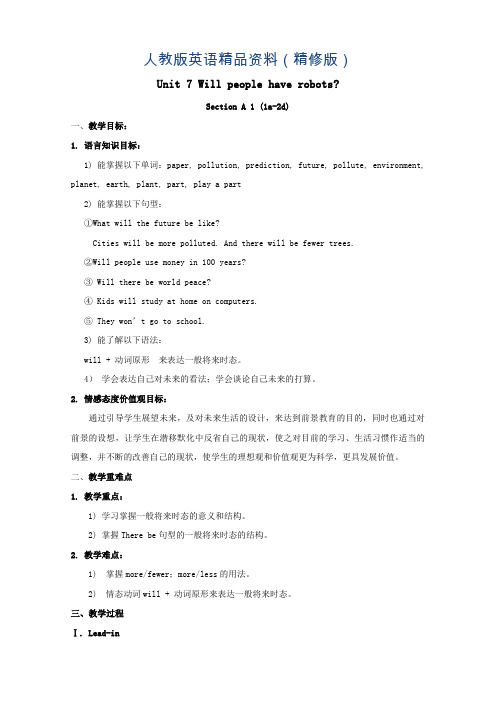
人教版英语精品资料(精修版)Unit 7 Will people have robots?Section A 1 (1a-2d)一、教学目标:1. 语言知识目标:1) 能掌握以下单词:paper, pollution, prediction, future, pollute, environment, planet, earth, plant, part, play a part2) 能掌握以下句型:①What will the future be like?Cities will be more polluted. And there will be fewer trees.②Will people use money in 100 years?③ Will there be world peace?④ Kids will study at home on computers.⑤ They won’t go to school.3) 能了解以下语法:will + 动词原形来表达一般将来时态。
4)学会表达自己对未来的看法;学会谈论自己未来的打算。
2. 情感态度价值观目标:通过引导学生展望未来,及对未来生活的设计,来达到前景教育的目的,同时也通过对前景的设想,让学生在潜移默化中反省自己的现状,使之对目前的学习、生活习惯作适当的调整,并不断的改善自己的现状,使学生的理想观和价值观更为科学,更具发展价值。
二、教学重难点1. 教学重点:1) 学习掌握一般将来时态的意义和结构。
2) 掌握There be句型的一般将来时态的结构。
2. 教学难点:1)掌握more/fewer;more/less的用法。
2)情态动词will + 动词原形来表达一般将来时态。
三、教学过程Ⅰ. Lead-in1. 在大屏幕上向学生展示一些机器人的图片,让学生们说出谈论自己的未来的工作,对工作的打算等:What do you want to be when you grow up?Ss: I want to be a scientist.T: How are you going to do that?Ss: I’m going to study science hard.….2. 学生们根据图片来引导出机器人这一话题。
